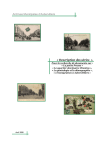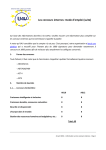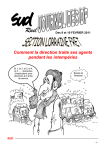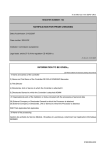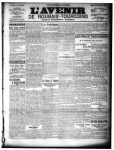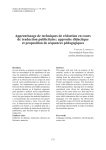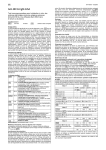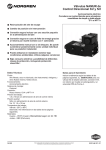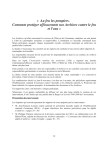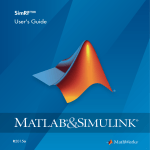Download Certification. Overview of training and tests
Transcript
N° 62 - January 2007
The 62nd edition of Management Matters
Premier exercice de certification à la Commission
Le bilan par Claude Chêne
Une interview en exclusivité pour les lecteurs de Management Matters, avant
publication dans Commission en direct : Claude Chêne, directeur général de la
DG Personnel et administration, analyse l’exercice de certification 2005 et
s’explique sur le lancement de celui de 2006. Coup d’envoi de ce nouvel
exercice le 5 février.
Pouvez-vous nous rappeler brièvement en quoi consiste la procédure de
certification ?
La certification est la procédure instaurée par le nouveau statut pour passer de la
catégorie B – ou désormais du groupe de fonctions des Assistants – à la catégorie A,
devenue le groupe de fonctions des Administrateurs. Elle se substitue donc aux concours
de passage de catégorie.
Il ne s'agit pas simplement d'un changement d'appellation: c'est un vrai changement
d'approche. Nous avons tenté un pari audacieux : donner de nouvelles perspectives de
carrière à ceux qui ont démontré un réel potentiel dans leur travail de tous les jours et
qui ont l'ambition et la volonté d'assumer des fonctions plus exigeantes ; valider les
compétences, les « soft skills », et non plus exclusivement les connaissances, les « hard
skills ». C'est une petite révolution pour la Commission.
Pour réussir ce pari, la Commission s'engage au côté de ses fonctionnaires, investit dans
son personnel. C'est là l'autre différence que je veux souligner. Les collègues ne sont pas
livrés à eux-mêmes dans la préparation d'un concours. Ils sont accompagnés par l'Ecole
européenne d'administration (EAS) qui leur dispense, sur leur temps normal de travail,
une formation solide axée justement sur ces « soft skills » : structurer une
argumentation, convaincre un auditoire, synthétiser un problème, etc.
Cette nouvelle approche offre-t-elle pour un « recruteur » les mêmes garanties
qu'un concours ?
Si je voulais grossir le trait, un concours vous donne la garantie que le lauréat maîtrise
un domaine, une technique… Est-ce déterminant pour ceux qui ont déjà dix ans
d'expérience au sein des Institutions et dont on a pu vérifier, à de nombreuses occasions,
le niveau de connaissance ?
La formation mise en place par l'EAS exige un investissement personnel important de la
part du fonctionnaire, contrepartie de l'investissement consenti par l'Institution. Le titre
de « certifié » n'est pas donné gratuitement. J'en veux pour preuve le taux d'échec de
30 % des 116 fonctionnaires de la Commission admis aux examens de fin de formation
en 2006. Il s'agit donc d'une formation sérieuse. On peut être innovant et rigoureux à la
fois.
Je vais d'ailleurs inviter personnellement les 84 lauréats de cette première promotion
pour les féliciter. Commission en direct se fera l'écho de cette petite réception dans une
prochaine édition.
Quid des collègues qui ont échoué ?
Ces 32 fonctionnaires ont la possibilité de se représenter aux épreuves. Nous
envisageons avec l'EAS de mettre en place des modules de rattrapage pour mettre ces
collègues en situation de réussir leur nouvelle tentative. Tout cela procède de la même
démarche: ne pas laisser les fonctionnaires sans soutien ; leur donner le maximum de
chances.
Quel bilan tirez-vous de ce premier exercice de certification ?
Il serait prétentieux de ma part de prétendre que tout a été parfait : ce ne peut pas être
le cas dès le premier exercice alors que la méthode vient de changer radicalement.
S'agissant de la formation, le taux de satisfaction de ceux qu'ils l'ont suivie est très
élevé. Un collègue soulignait dans ces mêmes colonnes, il y a deux semaines, combien il
avait apprécié le contenu de la formation et la nouvelle approche. Il nous faudra en tirer
toutes les leçons, avec l'EAS (dont je salue par ailleurs le travail) et avec les autres
Institutions puisqu'il s'agit d'une formation interinstitutionnelle. Je crois savoir qu'il y a
un consensus pour renoncer aux modules spécialisés qui restaient focalisés sur
l'acquisition de connaissances « dures ». (NDLR : Voir article suivant)
Là où j'aurais souhaité des changements, c'est dans le processus de sélection des
fonctionnaires autorisés à suivre le cycle de formation. Pour au moins deux raisons :
• La mesure du potentiel ne peut pas se faire exclusivement au travers d'une
addition de critères quantitatifs. Ce n'est pas un concept qui peut se résumer en
une équation mathématique. Il faut prendre en considération des appréciations
qualitatives.
• Nous avons constaté que la quasi-totalité des fonctionnaires sélectionnés étaient
des diplômés universitaires. Cela ne reflète pas la réalité de la catégorie B* : vous
avez dans ce groupe de nombreux collègues qui n'ont pas eu la chance de suivre
des études supérieures et qui ont pourtant le potentiel de devenir
Administrateurs. Ce potentiel est reconnu par leur hiérarchie. Pourquoi leur fermer
la porte de la certification ?
Suite au premier exercice, nous avons donc procédé à cette analyse critique de la
procédure de sélection. Un projet de nouvelles dispositions générales d'exécution a fait
l'objet d'une consultation interservices et de négociations avec les organisations
syndicales professionnelles (OSP). Au terme de plusieurs concertations approfondies qui
ont conduit à amender de manière substantielle notre projet initial, la majorité des OSP a
marqué son accord sur une nouvelle procédure qui encadrait l'introduction d'éléments
qualitatifs, renforçait considérablement le rôle du comité paritaire et permettait à un
nombre significatif de non-universitaires d'être retenus.
Une organisation syndicale a marqué son désaccord et a demandé la tenue d'une
nouvelle concertation. Cette demande, en retardant le lancement de l'exercice, nous
faisait courir le risque sérieux de mettre en cause la participation des fonctionnaires de la
Commission au prochain cycle de formation. Et je ne veux pas prendre ce risque.
Management Matters – N° 62 – January 2006
2
Je me vois donc contraint de lancer l'exercice de certification 2006 sur les mêmes bases
imparfaites que le premier. Je le regrette car ceci ne répond manifestement pas aux
attentes légitimes exprimées par la plupart des collègues concernés.
Propos recueillis par Caroline Schickel
Certification
Overview of training and tests
On 17 January, the Director of the European Administrative School spoke to the
Human resources' network about the training and tests of the first certification
exercise and plans for the second.
Of the 157 candidates from all Institutions, 109 passed all 4 exams and can therefore
apply for AD jobs. The overall pass rate of just less than 70% was perhaps lower than
some expected, but there were a number of factors at work. People had possibly underestimated the demanding nature of both the training programme and the exams, and for
a number of candidates there were language problems. In addition, just the fact of
concentrating on candidates' skills meant that many of them were faced with a type of
exam with which they were unfamiliar. My view is that it is vital for the credibility of the
procedure that it is as demanding as a competition, and that the exams though tough
were fair.
Candidates who failed one or more exams can re-sit them without having to go through a
new selection procedure or the training programme. Discussions will begin with all
institutions before the end of January to decide on arrangements for implementing these
provisions and the candidates concerned will be informed as soon as possible.
As regards the 2006/7 exercise, I underlined again that the key philosophy of
certification is to equip candidates with the skills they need to succeed as administrators
and then to verify that they possess them. It is not a test of their knowledge of specific
areas: in agreement with all the institutions, we have therefore decided to drop the
specific modules that featured in the first exercise. The new training programme will be
divided into two blocks of about 4 weeks in June and 2 weeks in October with about 10
days of individual exercises and assignments between the two. During the training
programme, candidates will have more opportunities to take part in simulations based on
what they will face in the exams. We are also making a number of minor adjustments to
take account of feedback from the first exercise.
We have just updated the information about certification on our website. This includes
details about the 2006/7 programme and an overview of the first exercise.
David Walker,
EPSO / EAS (European Administrative School)
The list of the 84 successful Commission officials was published on 16 January 2007 –
Administrative Notice 6-2007.
Commission en direct interviewed one of them: Cend 427
From middle to senior management
Potential senior officials to attend Assessment Centres
Building on what was already compulsory for candidates applying for external
senior management procedures, the Commission has further strengthened its
Management Matters – N° 62 – January 2006
3
focus on appointing high-calibre senior officials by introducing Assessment
centres for candidates applying for internal procedures as of January 2007.
How does this new measure affect you?
If you are a middle manager and plan to apply for a Director's post, you are undoubtedly
familiar with the eligibility criteria as laid down in the Compilation document (minimum
grade, having the necessary experience and profile in a management position for 2 years
at least…).
You will also know that the current recruitment procedure has three phases (preselection at DG level, interview with the Consultative Committee on Appointments (CCA)
and interview with one or more Commissioners) From January onwards, this will change
to include a full day at the assessment centre, prior to the CCA interviews.
Working with an external contractor, the Directorate dealing with CCA in DG ADMIN,
headed by Emer Daly, will be responsible for extending Assessment centres to internal
candidates.
During this full day, candidates are measured individually against a predefined set of
criteria and do not compete against each other. There is a mix of individual and group
exercises to assess the competencies i.e. in tray exercise, verbal and abstract reasoning
tests and personality questionnaires. Consistent high standards of integrity and efficiency
are identified and measured through a specific competency framework for senior
managers as used for the CDR for Senior management. This was defined in 2002
and is based on 5 major competencies:
• Information management
• Task management
• People management
• Interpersonal management
• Personal management
Using Assessment centres is widely acknowledged as a sophisticated selection method,
which measures performance against key criteria considered to be critical for a
particular position. It is a professional evaluation tool with a high predictable value. It
thus provides comprehensive information on the potential of the candidate available for
the CCA members.
The results are available, on a confidential basis, for CCA selection panel members and
remain valid for a period of 2 years. However, all participants can obtain oral feedback
from the Centre once the selection procedure is finalised.
Are you curious to discover more about Assessment Centres and what you can expect
from them? Please visit our website. We held a special open meeting on 30th January
to answer your questions; if you missed the meeting, slides of our presentation are
available on our website.
Do you have any specific questions? Our functional mailbox is available at the following
address: ADMIN ASSESSMENT CENTRE CCA.
Louise HEAD,
ADMIN CCA (Consultative Committee on Appointments)
Management Matters – N° 62 – January 2006
4
Career
Types of post
The new career structure, introduced by the Staff Regulations, was a key element in the
modernisation of the European Civil Service. The old career structure, classifying staff
into a rigid structure of four categories (A, B, C and D grades), was long considered
outdated, as it failed to take into account the changing nature of posts and new work
patterns, spurred on by rapid technological change.
Since 1st May 2006, however, all posts covered by the Staff Regulations are divided up
into an administrator’s function group (AD) and an assistant’s function group (AST), each
comprising different types of posts, for which the Commission is required to define
appropriate powers and duties.
The Personal and Administration DG has now prepared a draft Commission decision
defining these, and entered into consultations with other competent services.
Subsequently, the staff unions will also be consulted. For each type of post, the draft
decision identifies different functions, each corresponding to a given range of
grades, and the nature and importance of the relevant duties.
Under the old career structure, officials were often blocked at the top of their
category. For example, a 'C 1' official in the old career structure had to change category
by passing an internal competition, in order to progress and assume greater
responsibilities. Without changing category, further career development was impossible.
By contrast, staff recruited after 1st May 2004 will now find many realistic
opportunities for career development that previously did not exist. For example,
officials in the AST function group will be able to progress up to grade AST 11 and carry
out tasks previously considered as 'category B' tasks simply by virtue of being appointed
to a post including the relevant duties. No additional condition needs to be fulfilled.
As a result, among others, managers will find new ways to motivate and reward
their highly qualified staff currently recruited in the AST function group, who are capable
of more than what their actual tasks permit them to achieve. For example, someone
recruited at AST 1 level carrying out secretarial work and who should advance beyond
these tasks could be offered to move on to a post where he or she carries out
administrative or financial operations, once he or she reaches grade AST 3.
Needless to say, that these new career development perspectives require managers to
provide for a sound career planning and to define appropriate training measures. Staff
should be encouraged to consolidate competencies gained on the job or discover other
fields of responsibilities in order to open up these new opportunities. In turn, at a
central level appropriate training courses will be made available.
The Commission decision on types of posts will as well be of great interest for the
purposes of the attestation procedure. It will for the first time clearly identify the
functions at 'administrative assistant' level, applicants admitted to the attestation
procedure must be appointed to and thereby facilitate the attestation of staff.
For your staff, the adoption of the decision on types of posts will be an important step
forward towards a modern career structure that allows for a better personal career
development throughout a lifelong career.
We will keep you informed of further developments.
Stefanie Hiesinger, ADMIN A6 (Career structure, evaluation and promotion)
Management Matters – N° 62 – January 2006
5
Financial Regulation
What’s in the 2006's Revision?
The revision of the Financial Regulation applicable to the general budget of the
European Communities was adopted on 13/12/2006. Did you miss it? Relax and
breathe: for the moment this does not imply any radical change.
The amended articles that may affect your daily work are planned to enter into
application only on the 1st of May 2007, once the Implementing Rules linked to them
are adopted. Full briefing and Information sessions will be provided as from April.
Nevertheless, the revision of the Financial Regulation has an immediate effect on you,
as from 1st of January 2007, if you work in the fields of agricultural and structural
funds. But even in this case, no need to start shaking: the amended articles mainly
bring the Financial Regulation in line with the respective funds’ regulations already in
force and therefore imply just a few practical changes.
If you work in these fields, you might want to take a look at the “Focus-on” section
on BudgWeb’s homepage where you can find the Newsflash by the Central Financial
Service, the text of the Council Regulation (EC, Euratom) No 1995/2006, an article by
article summary of the changes and much more.
Of course, do not miss the next stage of the revision process: we’ll be there!
With best wishes for the New Year and your future financial management on behalf of the
Central Financial Service, DG BUDGET, Directorate D.
Silvia Mora, BUDG D4 (Internal Communication Officer and Trainer)
Selection & Recruitment
Publication at grades AD9-12 for Head of Unit posts declared unlawful
What started off as a rather classic case of a colleague contesting that he was
not selected for a Head of Unit post, resulted in a rather unexpected judgment
of the Civil Service Tribunal (case F-122/05, published on 14 December 2006).
As is often the case, the complainant invoked the "erreur manifeste d'appréciation" of the
Appointing Authority in the context of the selection procedure. This argument was
rejected by the Tribunal.
However, the complainant also advanced that the selection procedure itself was to be
considered illegal, claiming that the grade at which the post is filled is fixed only at the
end of the selection procedure and therefore at a stage where the identity of the
candidates for the post is known.
It is true that the Commission Decision on middle management staff foresees that the
candidate selected for a Head of Unit post at level AD9-12 is appointed in his/her current
grade. However, the level of the post is fixed clearly before the selection procedure is
launched, either at level AD9-12 or AD13-14.
Much to the Commission's surprise, the Tribunal did nevertheless declare the procedure
illegal.
The Tribunal apparently defines the “level” of a Head of Unit post by reference to annex I
of the Staff Regulations concerning the types of posts (“emplois-types” – see related
Management Matters – N° 62 – January 2006
6
article in this edition) in each function group, stating that this annex allows for the
distinction between 3 groups of grades: AD9-10, AD11-12 and AD13-14. As a
consequence, the Tribunal considers the publication of a Head of Unit post in grade band
AD9-12 to be illegal as this band includes 2 “levels”, the final “level” at which the
post is filled being fixed by the grade of the person selected (i.e. at the end of the
procedure, the person selected being appointed in his/her current grade).
An appeal against this judgment is currently under consideration. In the meantime
however, the Commission will have to comply with the ruling. As a consequence,
vacant Head of Unit posts will have to be published either at level AD9-10, AD11-12 or
AD13-14 (the latter being the case already today).
In addition, some 50 internal selection procedures which were underway will have to be
cancelled.
Stefaan Ceuppens
ADMIN A5 (Organisation Chart and Management Staff)
Rubrique pratique
Séance de rattrapage
Voici quelques brèves de ce début d'année qui vous auraient peut-être
échappé : transports publics, congés, etc.
Remboursement des abonnements de transports publics
La participation – prévue initialement à partir de 2007 - de 50 % aux frais d’abonnement
des transports publics, n’a pas été acceptée par les autorités budgétaires.
Le budget autorisé pour l’année 2007 ne permet pas de lancer le remboursement des
abonnements tel que proposé. Il sera utilisé pour renforcer des actions existantes (vélos,
infrastructures et autres mesures) - sur lesquelles, bien évidemment, nous reviendrons.
Simplification administrative : ce qui est prévu pour 2007
La Task Force "Simplifions nos procédures administratives" a présenté au vice-président
Kallas un premier rapport des améliorations en cours et celles qui sont en projet (dont
une charte de qualité de service). Vous pouvez lire le résumé sur le site web de la Task
Force ou dans Commission en plus du 12 janvier. C'est une preuve de plus que l'usager a
de bonnes idées et que l'administration les prend en compte.
Comment demander un congé ?
Mode d'emploi de la nouvelle application de Sysper2 appelée Gestion du temps ("Time
Management") pour remplacer le SIC Congés : une conférence pour le personnel était
organisée le 17 janvier pour expliquer les avantages de ce nouvel outil et répondre à vos
questions. Ce fut un succès : une salle pleine à Bruxelles et des questions/réponses
depuis tous les autres sites en vidéoconférence (dont Ispra et Grange), une ambiance
constructive et des réponses concrètes à des petits soucis de jeunesse du module.
Vous pouvez regarder sur votre PC l'enregistrement de la présentation et lire la
présentation, depuis le site web de la Task Force.
Une foire aux questions a aussi été élaborée par la DIGIT pour les thèmes les plus
récurrents (délégations à donner par le chef d'unité à sa/son secrétaire pour la saisie de
absences, etc.) sur le site de Sysper2.
Management Matters – N° 62 – January 2006
7
Rédactrice en chef : Caroline Schickel / 60 709 - [email protected]
Editeur responsable : Sonia Fumagalli / 66 853
Cette newsletter électronique est publiée par l’unité Communication et gestion de l’information, DG
Admin D5
Editorial team
ANDERSEN Ian (SCIC) - ANDRE-KAUT Martina (COMM) - COLLINS Stephen (BUDG) - EMION Gerard
(IAS) - GEMBERG-WIESIKE Alexander (ADMIN) - HERION Valerie (PMO) - HILLBRAND Ursula (SG) LESTOQUOIT Olivier (OIB) - LEVASSEUR Christian (ADMIN) - LINDER Christian (ADMIN) - MAMER Eric
(BUDG) - MERLETTI Giordano (ADMIN) - MICHALAK-PALARZ Klaudia (OPOCE) - PAQUOT-WITCZAK
Natalia (EPSO) - SEGUINOT Marc (OIL) - SHOOTER Neil (DIGIT) - SPEZIARI Frederique (OIL) TZIRANI Marie (PMO) - VLANTIS Ioannis (EPSO)
We would like to inform our readers that the articles published in Management Matters reflect the
opinion of the respective authors.
The newsletter is intended for managers but other staff members are welcome to subscribe.
Management Matters – N° 62 – January 2006
8








